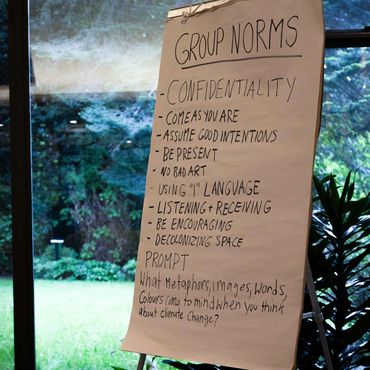Research at the University of Victoria
MA Thesis: Creating Climate Resilience: An Arts-based Approach for Helping Youth Process Climate Anxiety and Generate Active Hope
Sabrina's study in the School of Environmental Studies explored 1) can visual artmaking and dialoguing help young people process climate anxiety and related eco-emotions? If so, how? And 2) in what ways might this arts-based approach help youth generate active hope, if at all? She investigates these questions through the design, piloting and evaluation of three visual artmaking and dialogue sessions with youth ages 17 – 21 in Victoria BC. The findings point towards the vital need for youth-led spaces in which they feel safe to express a wide palette of emotions about the climate crisis without expectation of resolution.
Equity-driven Best Practices in Climate Adaptation Guide
Commissioned by the city of Victoria's Climate Adaptation team and the Community Social Planning Council of Greater Victoria, the purpose of this guide is to review existing climate adaptation plans to a) identify gaps in addressing the needs of vulnerable populations, and b) identify best practices of integrating dimensions of equity in climate adaptions plans at the municipal level. The research questions include: 1. How can equity be effectively embedded in municipal climate adaptation planning and implementation? 2. How can best practices from other jurisdictions be replicated or tailored for the city of Victoria?
Policy Advocacy & Op-Eds
Northern Climate Policy Manual: Demystifying Climate Governance at the Federal and Territorial Level
Commissioned by Crown-Indigenous Relations and Northern Affairs Canada and co-authored with Youth Climate Lab colleagues. Published October 2022 on the Youth Climate Toolbox.
Multi-solving for a Green Recovery: Youth Voices and Approaches to Building Back Better
Commissioned by the International Development Research Centre, conducted by Youth Climate Lab in partnership with the Green Africa Youth Organization, and co-authored with Paluck Kohli from the Centre for Social Innovation. Published November 2021 on the Youth Climate Toolbox.
Stop the scapegoating! Young people are doing their share in the fight against COVID
Op-ed written for the The Nova Scotia Advocate, published on January 25th, 2021.
Building Back Better: Expanding Green Jobs for Youth
Research conducted as part of the Canadian Council for Youth Prosperity Fellowship (2020 - 2021). Report includes findings from a cross-Canada survey of 250+ youth and 8 interviews with experts. Identified key opportunities and barriers for youth with marginalized identities to enter the environmental workforce, and recommendations to improve federally funded wage subsidy programs.




This website uses cookies.
We use cookies to analyze website traffic and optimize your website experience. By accepting our use of cookies, your data will be aggregated with all other user data.